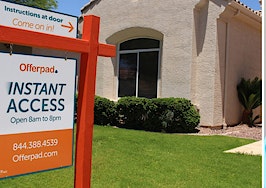Flush with hundreds of millions in venture funding, the fast-growing home-buying and selling startup Opendoor is making its first acquisition: Open Listings, a discount brokerage with a team of salaried in-house real estate agents and partner agents, which offers homebuyers a 50 percent rebate on a buyer’s agent’s commission. Neither of the private companies disclosed the purchase price.
“By integrating Open Listings with Opendoor’s mortgage, title and home services, the company will make it as easy to buy, sell or trade-in a home as it is to hail a ride, book a flight, or shop online,” Opendoor said in a press release announcing the deal.
Why this deal is so important
For starters, it transforms Opendoor into a company that employs some buyer’s agents, while also working with agents from other brokerages and splitting commissions with them.
The acquisition may further bolster Opendoor’s offerings to consumers. Launched in 2014, the San Francisco-headquartered company has raised $645 million in equity financing and $1.75 billion in debt and will be in 18 markets across the country by the end of the year, including major American metropolitan regions including Las Vegas, Denver, Minneapolis and Atlanta.
In all of these markets, prospective homesellers can visit the company’s website or app, enter their property information and receive a near-instant cash offer on their home from Opendoor.
The cash offer comes with service charges averaging 6.5 percent (though the fees range between 6 and 12 percent), minus any repair fees, and the offer may be less than what the home would fetch if listed on the open market by a human agent.
But Opendoor’s promise is that of convenience: all cash, quick closes in days, without showings or engagement with real estate agents. Opendoor makes minor repairs and upgrades to the homes and re-lists them for sale on three platforms: the multiple listing service, its website and app. The startup doesn’t buy foreclosures and appears to pay, if not full market value, something generally close to it, setting it apart from many traditional home flippers.
Opendoor bought more than 1,000 homes in August, up from 400 a year ago, according to company spokesperson Heather Staples. It has serviced around 20,000 customers since its founding, according to the company’s website.
If it previously was on track to disrupt listing (seller’s) agents, the Open Listings acquisition gives Opendoor a tech-powered service that, for now at least, is half as expensive as a typical buyer’s agent.
Open Listings, which was founded in 2015 out of the San Francisco startup accelerator Y-Combinator and operates throughout California and the cities of Seattle, Chicago, Austin and Dallas pairs a personalized online home search platform with assistance that comes largely from agents at other brokerages to help buyers find, see and purchase homes.
The company also offers a 50-percent commission refund to buyers, meaning Open Listings takes the typical 2.5 or 3 percent commission that a buyer’s broker would normally receive (usually paid by the seller and split from the total 6 percent commission with the listing agent/seller’s agent), halves it, and gives half back to the buyer. This is, in effect, a way to save on the buyer’s other closing costs.
Open Listings says it “sav[es] our customers an average of $9,604 at close,” or $7,250 on a $580,000 home purchase, which it compares to a $1,000 credit from rival discount brokerage Purplebricks. In late July, it reported facilitating $1 billion in real estate transactions since its founding, and currently claims to have saved buyers $8 million in commission.

Opendoor CEO Eric Wu. Credit: Opendoor
Tie in Opendoor’s mortgage and title services, and the combined companies will try to offer a more affordable “end-to-end” moving experience.
Consumers should be able to “shop, discover, visit, sell and close, all with one trusted brand,” Opendoor CEO Eric Wu said about acquiring Open Listings, which is based in Los Angeles. “And that should be Opendoor.”
Industry analyst Michael DelPrete says Opendoor’s new buy-side service “effectively closes the loop to the business model.”
“Closing the loop means each customer can remain in the Opendoor ecosystem, which can have a negative impact on market incumbents and traditional brokers that aren’t part of that ecosystem,” he added.
“2018 is shaping up to be the year Opendoor goes big,” DelPrete said. “The national rollout appears to be quite aggressive; most likely an accelerated land grab (spurred on by Zillow entering the market).”
Zillow Group launched its own online homebuying and selling service earlier this year, joining a growing wave of companies known as iBuyers, which all share the use of technology, the internet, and apps to enable near-instant cash offers for prospective homesellers.
However, Zillow does not currently employ any real estate agents, instead using the agent customers of its Premier Agent advertising program to represent it when it purchases homes from consumers and lists them for sale online. Yet with Open Listings having both its own in-house agents and partner agents, Opendoor now will be getting a company that competes more directly with Zillow.

Credit: Daniel Fishel/Inman
What Opendoor is getting out of it
First, Opendoor is immediately getting new technology to compliment its own.
“[Open Listings] developed a proprietary self-service platform that puts the buyer in control of the entire process from search to offer-creation to close,” Opendoor said in a statement. “Customers use Open Listings to manage the process and are connected with on-demand agents as needed and receive cost savings of up to 50 percent of the agent commission.”
Opendoor chose to buy Open Listings rather than some of the other low-fee, high-tech brokerages because it seemed to offer a “sweet spot” between self-service, automation and hands-on assistance, according to Julia DeWahl, who heads up Opendoor’s trade-in program.
Open Listings launched based on the premise that real estate agents’ commissions don’t properly reflect their diminishing role in the home-buying process.
“Shop without an agent,” the startup’s website originally read. “We’ve got your back.”
Like other real estate startups, Open Listings has since dropped the anti-agent rhetoric and made agents a core part of its service — in this case, by tapping outside agents who wish to partner with it to provide certain services to customers, namely: scheduling home tours, for which Open Listings pays partner agents hourly; or working as a “buying agent,” and helping a buyer close their transaction, in exchange for commission splits.
In addition to partner agents, Open Listings also uses some in-house agents that work as independent contractors and a handful of salaried agents classified as employees.
Asked if Open Listings will hire any in-house agents or exclusively refer buyers to partner agents that work at other brokerages, Staples said Open Listings would continue to use a “mix of roles that best support the customer experience.”
“Qualifying agents can select to be a partner agent for showings and for the offer and closing assistance, or they can choose to partner with us on just one part — it’s up to them,” Staples said.
Opendoor plans to be operating in 50 markets by the end 2020. It’s aiming to go public at some unspecified date in the future.

The future of homebuying: trading up?
In March 2016, Opendoor announced a “trade-in” program designed to solve a quandary facing many repeat homebuyers in the U.S.: in order to afford a new home, buyers may first have to sell their old one.
However, it can be quite difficult to arrange both transactions to occur in the timeframe necessary to avoid staying in other temporary accommodations, and risks sellers losing out on the home they wish to buy if their purchase is contingent on a sale that falls through. Opendoor’s trade-in program tries to offer sellers the ability to apply for a mortgage, as well as arrange closing and move-out dates on their own time and schedule lease-backs.
DeWahl, who heads up Opendoor’s trade-in program, calls the addition of Open Listings the “best of both worlds”: buyers can do whatever they would like to do on their own and then tap Open Listings for “agent and expert guidance when you need it.”
Another way of looking at the acquisition: It allows Opendoor to apply a version of its existing trade-in experience — the one overseen by DeWahl — to all for-sale inventory in a market, instead of restricting it to only the homes Opendoor is selling.
Under the current trade-in program, homesellers moving between markets where Opendoor operates can sell their old home to Opendoor and purchase a new one owned by the company.
They can also use a similar process to sell their old home to Opendoor and purchase a new one from 19 of the country’s 25 largest homebuilders, Wu said. Opendoor has enabled homebuilders to sell $450 million-worth of homes so far, according to Staples.
By fusing its core purchasing service for sellers with Open Listings, Opendoor allows customers to coordinate the sale of their old home to Opendoor with the purchase of any new home — not just properties owned by Opendoor or its partner homebuilders.
“By integrating Open Listings’ online buying experience with Opendoor, we’re putting customers in control of the entire process so they can buy, sell or trade-in their home seamlessly be it for retirement, up-sizing for a growing family or moving for a dream job,” Wu said in a statement.
Staples said Opendoor’s plan is to integrate Open Listings’ and Opendoor experiences, “and [how] that plays out in terms of brand and websites will be determined as the integration process kicks in.”
Opendoor will expand Open Listings from its existing markets (where Opendoor currently boasts more than 500 listings) to all markets where Opendoor is operating in the “medium-term,” Wu said.
This will involve recruiting many partner agents across the country in the coming months.
“Some partner buying agents run their entire business on Open Listings’ referrals,” Staples said. Wu also left open the possibility that Opendoor could partner with brokerages, not just individual agents.
What will Opendoor look for in partner agents?
Wu said it will assess candidates based on three criteria: “One is alignment on mission, so building great services and experiences for customers and movers; the second is alignment around core values and operating principles; and third is that we can provide them” with the “suite of services, applications and tools to make their businesses more efficient.”

Credit: Daniel Fishel/Inman
What’s next for the combined companies?
Opendoor’s acquisition means even more stiff competition for the expanding space of iBuyers, as well as more direct competition with local real estate agents who don’t wish to partner with it via Open Listings.
That could test Opendoor’s ability to continue to maintain what has been — relatively speaking — a civil relationship with the industry, based partly on Opendoor’s willingness to make typical offers of compensation to agents for bringing buyers to its listings, as well as its tendency to refer some sellers who aren’t a good fit for Opendoor to other agents.
Asked about how Opendoor could deal with potential industry pushback, Wu said that agents “really love Open Listings” and advised Inman to “look at their reviews and even talk to agents who are currently on their platform.”
DeWahl said in response to the same question that Opendoor is one of many companies transforming the buying and selling process and that the company is responding to “what customers want.”
“Open Listings has been able to modernize that relationship between the agent and the buyer,” she said.
While Open Listings partner agents may earn only half the commission agents normally do for representing buyers, its owners claim they can receive a high volume of customers through the brokerage and focus on the “fun stuff” of helping house hunters actually purchase homes, rather than the “endless shlepping of people who might not want to buy a house.”














